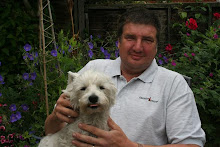 |
| Change of day-length vs days through year (50N). |
We are doing really well for eggs at present, what with it being, I suppose, peak season, Equinox an' all that. We have 11 hens and have had two days in the last week where they have laid, between them, 10 eggs, though the norm is around 7 eggs. We are also getting one every other day from each goose and, we think, a daily Guinea fowl egg since the 18th. Today we thought we might be on for the 'full chicken house', 11 from 11 - we had already collected ten and there was a cackling, clucking racket going on mid afternoon as if someone was proclaiming another arrival, but no, it was a false alarm and the girls are keeping us waiting.
 |
| Min (left) and Henry (right) |
I love all the physics around Equinoxes and day-length, At the Equinox, most people know, we have equal daylight and night-time hours (well, almost, there is some detail around this to do with latitude and the not-exactly perfect elliptical orbits) but this is also the time of the fastest CHANGE of day length. We are effectively accelerating towards summer at the fastest rate, with days getting longer at around 3 minutes per day, 21 minutes a week (spread across both ends of the day, of course), which is why you can easily see and feel it. This currently affects us more intensely than when we lived in the UK, because chicken 'bed-time' moves with darkness hours, and is currently around 7 pm, earlier on gloomy, cloudy evenings, later on bright sunny ones. Our 'bee school' starts at 8 pm, an hour away in Longford town, so for yesterday's we'd been worried since the previous class that we might have to be late for this one as we chased the last few chooks to bed before we could set out on the journey. It was close, but luckily Monday evening was cloudy, rainy and I could lock everyone up by 6:45 pm. For the next two sessions, it will not matter because the clocks will have changed.
 |
| Enjoying the spring sunshine |
We also do very well for meals created from left overs; we throw very little food away which, in turn, means we do not have to worry about cooking too much. I have been enjoying a superb parsnip soup born out of big dig of the roots. Tonight was cold roast lamb (leg of Dora) with that lovely, soul-food, winter-warmer "Champ", mashed potatoes cooked back up with left over leeks and sprouts with some runner beans added and, beautifully, including the golden "burnt crispy bits" (BCBs; a food group in their own right!)
 |
| The entrance to the turf 'mine'. |
Talking of left overs and springtime, the lovely weather has me out in the garden re-starting some jobs abandoned last autumn as it got too wet and cold, one of which is the earth bank which houses the half buried horse-drawn hay-rake. At the hay rake end we were uncovering some old hand 'won' "sausage" turfs and wondered whether we have in fact a 'clamp' left over from the TK-Min or even the TK-Max days. Well, I am now working in from the other end, a good 15 feet away and have come across what may be the other end of the clamp. We suspect that this is not any kind of official clamp, more a pile of turfs which got buried under some bulldozed topsoil, but they are lovely. They are up to around 5 inches diameter and cylindrical, the longest bits up to a foot long. They are buried like the ice-cream in a baked Alaska and it is a simple matter to lift them out from the entrance to the 'mine' as I work my way along the bank - I am getting barrow loads. Free fuel for next winter if I can get them dry.
Finally on the spring theme, we hear from our sheep man, Kenny O'C that he has just started lambing with a first batch of 5 lambs born on a lovely sunny day. We have put our order in for 5 again as last year, including one for the Sparks's and one for the Silverwood tribe. We'll probably get them, all being well, around July time. Their field is currently resting after its horse residence through the winter, and is already starting to look visibly greener. It is also pleasingly free from the rushes which badly infested it when we moved in. That is down to the mowing, strimming and sheep and horse grazing and gives us a little glow of pride at having improved the pasture we took over.






No comments:
Post a Comment